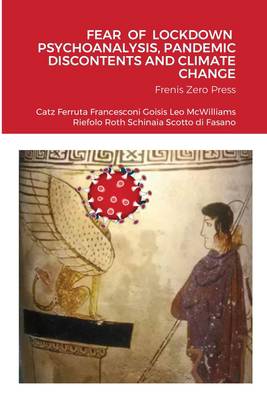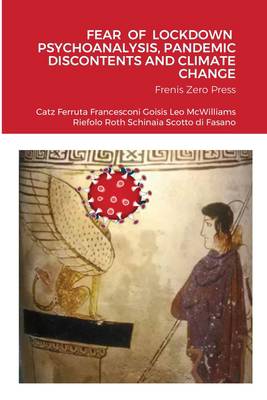
- Afhalen na 1 uur in een winkel met voorraad
- Gratis thuislevering in België vanaf € 30
- Ruim aanbod met 7 miljoen producten
- Afhalen na 1 uur in een winkel met voorraad
- Gratis thuislevering in België vanaf € 30
- Ruim aanbod met 7 miljoen producten
Zoeken
Fear of Lockdown Psychoanalysis, Pandemic Discontents and Climate Change
Frenis Zero Press
Nancy McWilliams, Anna Ferruta, Cosimo Schinaia
Paperback | Engels
€ 66,45
+ 132 punten
Omschrijving
Contemporary psychoanalysis has recently made a "paradigm shift" consisting of dealing with the discontents of civilizations emerging from the extension of the explicative dominion of psychoanalysis not only in the direction of social and political phenomena, but also in that of understanding the impact of environmental and ecological issues on the human psyche. New paradigms need new concepts such as the term "pandemic discontent", contained in the title of the present book. The concept of "pandemic discontents" refers to Freud's "Civilization and its Discontents" in order to focus on those anthropological mutations, including the expansion of technologies and the mutations of ecology, which represent irreversible fractures which have shifted a part of humanity in the face of the fragility of the social and cultural structures on which, as Kaës writes, the permanence of a civilization is based, or even the human species itself. And dealing with the discontents of civilizations leads psychoanalysis to a challenge which has not yet been completely assimilated, i.e. to measure up to the social dynamics and no longer only the intra-psychic ones, and to think of these changes as 'extra-psychic conditions', as Kaës defines them, which provide a framework or a setting for the formation of the psychic apparatus, for the forms of subjectivity that derive from them and for the sufferings they have produced. After the foreword written by Nancy McWilliams, "Psychotherapy in a Pandemic", written during lockdown in NY and dealing with therapists' feelings during online consultations, after the introduction written by the editor, Giuseppe Leo, the section "Psychoanalysis in Pandemic Times" (writings by Anna Ferruta, Hilda Catz, Giuseppe Riefolo, Merav Roth, and Cosimo Schinaia) concerns how to apply analysis to the Covid-19 crisis (psychoanalysis as a tool for interpretation of the pandemic crisis at various levels, individual, social, political) but also how to practice analysis under the Covid-19 pandemic (dealing with the conditions under which the practise of psychoanalysis is possible in such an unprecedented global context). The section "When the psychoanalyst is the patient" contains the memoir written by Pietro Roberto Goisis, a Milan-based psychiatrist and psychoanalyst who survived the coronavirus. In this pandemic both analyst and patient have to deal with a dangerous external reality, with the supplementary task for therapist of helping the p
Specificaties
Betrokkenen
- Auteur(s):
- Uitgeverij:
Inhoud
- Aantal bladzijden:
- 296
- Taal:
- Engels
Eigenschappen
- Productcode (EAN):
- 9788897479215
- Verschijningsdatum:
- 8/09/2020
- Uitvoering:
- Paperback
- Formaat:
- Trade paperback (VS)
- Afmetingen:
- 152 mm x 229 mm
- Gewicht:
- 399 g

Alleen bij Standaard Boekhandel
+ 132 punten op je klantenkaart van Standaard Boekhandel
Beoordelingen
We publiceren alleen reviews die voldoen aan de voorwaarden voor reviews. Bekijk onze voorwaarden voor reviews.








